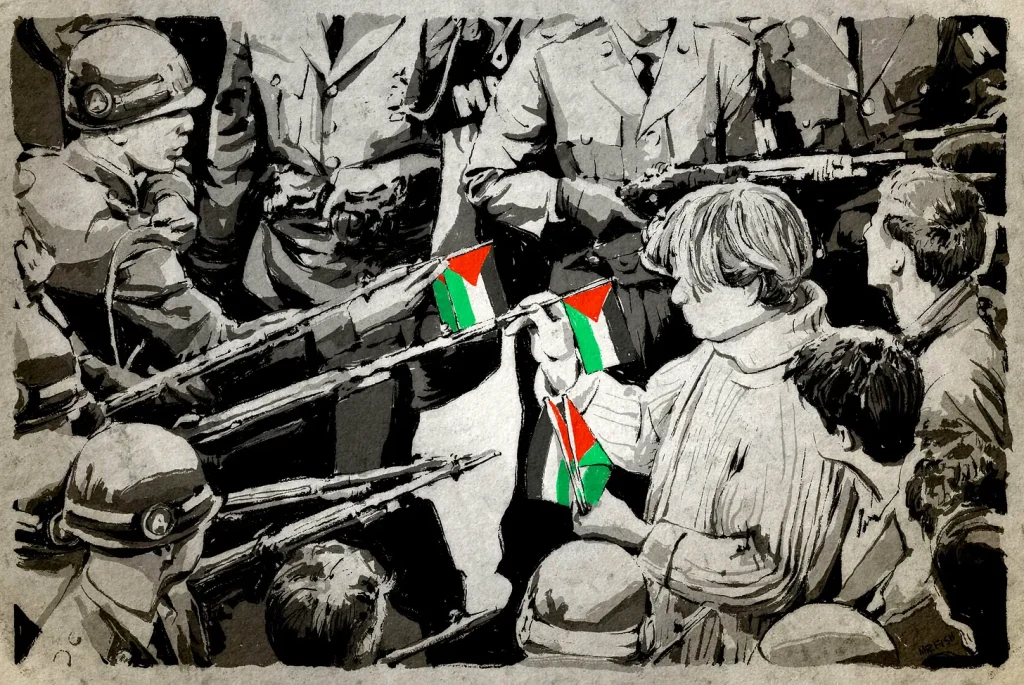“Revolt in the Universities”

University students across the country, facing mass arrests, suspensions, evictions and explusions are our last, best hope to halt the genocide in Gaza.

PRINCETON, N.J. — Achinthya Sivalingam, a graduate student in Public Affairs at Princeton University did not know when she woke up this morning that shortly after 7 a.m. she would join hundreds of students across the country who have been arrested, evicted and banned from campus for protesting the genocide in Gaza.
She wears a blue sweatshirt, sometimes fighting back tears, when I speak to her. We are seated at a small table in the Small World Coffee shop on Witherspoon Street, half a block away from the university she can no longer enter, from the apartment she can no longer live in and from the campus where in a few weeks she was scheduled to graduate.
She wonders where she will spend the night.
The police gave her five minutes to collect items from her apartment.
“I grabbed really random things,” she says. “I grabbed oatmeal for whatever reason. I was really confused.”
Student protesters across the country exhibit a moral and physical courage — many are facing suspension and expulsion — that shames every major institution in the country. They are dangerous not because they disrupt campus life or engage in attacks on Jewish students — many of those protesting are Jewish — but because they expose the abject failure by the ruling elites and their institutions to halt genocide, the crime of crimes. These students watch, like most of us, Israel’s live-streamed slaughter of the Palestinian people. But unlike most of us, they act. Their voices and protests are a potent counterpoint to the moral bankruptcy that surrounds them.
Not one university president has denounced Israel’s destruction of every university in Gaza. Not one university president has called for an immediate and unconditional ceasefire. Not one university president has used the words “apartheid” or “genocide.” Not one university president has called for sanctions and divestment from Israel.
Instead, heads of these academic institutions grovel supinely before wealthy donors, corporations — including weapons manufacturers — and rabid right-wing politicians. They reframe the debate around harm to Jews rather than the daily slaughter of Palestinians, including thousands of children. They have allowed the abusers — the Zionist state and its supporters — to paint themselves as victims. This false narrative, which focuses on anti-Semitism, allows the centers of power, including the media, to block out the real issue — genocide. It contaminates the debate. It is a classic case of “reactive abuse.” Raise your voice to decry injustice, react to prolonged abuse, attempt to resist, and the abuser suddenly transforms themself into the aggrieved.
Princeton University, like other universities across the country, is determined to halt encampments calling for an end to the genocide. This, it appears, is a coordinated effort by universities across the country.
The university knew about the proposed encampment in advance. When the students reached the five staging sites this morning, they were met by large numbers from the university’s Department of Public Safety and the Princeton Police Department. The site of the proposed encampment in front of Firestone Library was filled with police. This is despite the fact that students kept their plans off of university emails and confined to what they thought were secure apps. Standing among the police this morning was Rabbi Eitan Webb, who founded and heads Princeton’s Chabad House. He has attended university events to vocally attack those who call for an end to the genocide as anti-semites, according to student activists.
As the some 100 protesters listened to speakers, a helicopter circled noisily overhead. A banner, hanging from a tree, read: “From the River to the Sea, Palestine Will be Free.”
The students said they would continue their protest until Princeton divests from firms that “profit from or engage in the State of Israel’s ongoing military campaign” in Gaza, ends university research “on weapons of war” funded by the Department of Defense, enacts an academic and cultural boycott of Israeli institutions, supports Palestinian academic and cultural institutions and advocates for an immediate and unconditional ceasefire.
But if the students again attempt to erect tents – they took down 14 tents once the two arrests were made this morning – it seems certain they will all be arrested.
“It is far beyond what I expected to happen,” says Aditi Rao, a doctoral student in classics. “They started arresting people seven minutes into the encampment.”
CONTINUE READING
One of our country’s most important freedoms is that of free speech.
Agree with this essay? Disagree? Join the debate by writing to DailyClout HERE.




